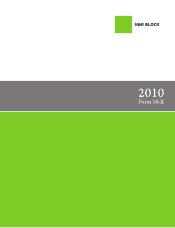HR Block 2010 Annual Report Download - page 21
Download and view the complete annual report
Please find page 21 of the 2010 HR Block annual report below. You can navigate through the pages in the report by either clicking on the pages listed below, or by using the keyword search tool below to find specific information within the annual report.The Gramm-Leach-Bliley Act and related Federal Trade Commission (FTC) regulations require income tax
preparers to adopt and disclose consumer privacy policies, and provide consumers a reasonable opportunity to
“opt-out” of having personal information disclosed to unaffiliated third-parties for marketing purposes. Some
states have adopted or proposed strict “opt-in” requirements in connection with use or disclosure of consumer
information. In addition, the IRS generally prohibits the use or disclosure by tax return preparers of taxpayer
information without the prior written consent of the taxpayer.
Federal statutes and regulations also regulate an electronic filer’s involvement in RALs. Electronic filers must
clearly explain the RAL is a loan and not a substitute for or a quicker way of receiving an income tax refund.
Federal laws place restrictions on the fees an electronic filer may charge in connection with RALs. In addition,
some states and localities have enacted laws and adopted regulations for RAL facilitators and/or the advertising of
RALs.
Certain states have regulations and requirements relating to offering income tax courses. These requirements
include licensing, bonding and certain restrictions on advertising.
The IRS published proposed amendments on March 26, 2010 that, if finalized, would: (1) require all tax return
preparers to use a Preparer Tax Identification Number (PTIN) as their identifying number on federal tax returns
filed after December 31, 2010; (2) require all tax return preparers to be authorized to practice before the IRS as a
prerequisite to obtaining or renewing a PTIN; (3) cause all currently issued PTINs to expire on December 31, 2010
unless properly renewed; (4) allow the IRS to conduct tax compliance checks on tax return preparers; and
(5) define the individuals who are considered “tax return preparers” for the PTIN requirement. Additionally, it is
expected that five other proposed regulations will be released in calendar year 2010. These would propose to:
(1) establish instructions for tax return preparers related to legislative e-file mandate requirements; (2) set the
amount of the PTIN user registration fee; (3) establish a new class of practitioners who are authorized to practice
before the IRS under Circular 230 called “registered tax return preparers” and require them to pass a competency
examination as a prerequisite to becoming a registered tax return preparer, complete annual continuing
professional education requirements, and comply with ethical standards; (4) set the amount of a sponsor fee
for qualified continuing professional education sponsors; and (5) set the amount of a competency examination
user fee.
As noted above under “Offices,” many of the income tax return preparation offices operating in the U.S. under
the name “H&R Block” are operated by franchisees. Our franchising activities are subject to the rules and
regulations of the FTC and various state laws regulating the offer and sale of franchises. The FTC and various state
laws require us to furnish to prospective franchisees a franchise offering circular containing prescribed
information. A number of states in which we are currently franchising regulate the sale of franchises and
require registration of the franchise offering circular with state authorities and the delivery of a franchise offering
circular to prospective franchisees. We are currently operating under exemptions from registration in several of
these states based on our net worth and experience. Substantive state laws regulating the franchisor/franchisee
relationship presently exist in a substantial number of states, and bills have been introduced in Congress from time
to time that would provide for federal regulation of the franchisor/franchisee relationship in certain respects. The
state laws often limit, among other things, the duration and scope of non-competition provisions, the ability of a
franchisor to terminate or refuse to renew a franchise and the ability of a franchisor to designate sources of supply.
From time to time, we may make appropriate amendments to our franchise offering circular to comply with our
disclosure obligations under federal and state law.
We also seek to determine the applicability of all government and self-regulatory organization statutes,
ordinances, rules and regulations in the other countries in which we operate (collectively, Foreign Laws) and
to comply with these Foreign Laws. In addition, the Canadian government regulates the refund-discounting
program in Canada. These laws have not materially affected our international operations.
HRB Bank is subject to regulation, supervision and examination by the Office of Thrift Supervision (OTS), the
Federal Reserve and the Federal Deposit Insurance Corporation (FDIC). All savings associations are subject to the
capital adequacy guidelines and the regulatory framework for prompt corrective action. HRB Bank must meet
specific capital guidelines involving quantitative measures of HRB Bank’s assets, liabilities and certain off-balance
sheet items as calculated under regulatory accounting practices. HRB Bank’s capital amounts and classification
are also subject to qualitative judgments by the regulators about components, risk-weightings and other factors.
As a savings and loan holding company, H&R Block, Inc. is also subject to regulation by the OTS.
See Item 7, “Regulatory Environment” and Item 8, note 19 to the consolidated financial statements for additional
discussion of regulatory requirements.
See discussion in Item 1A, “Risk Factors” for additional information.
H&R BLOCK 2010 Form 10K 5
























